初高中语法衔接八大时态基本结构(附练习题及答案)
初中英语八大时态详细语法解析习题及答案
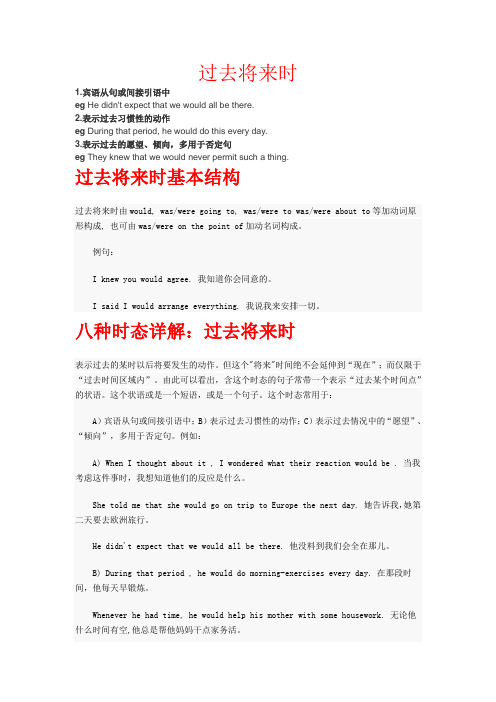
过去将来时1.宾语从句或间接引语中eg He didn't expect that we would all be there.2.表示过去习惯性的动作eg During that period, he would do this every day.3.表示过去的愿望、倾向,多用于否定句eg They knew that we would never permit such a thing.过去将来时基本结构过去将来时由would, was/were going to, was/were to was/were about to等加动词原形构成, 也可由was/were on the point of加动名词构成。
例句:I knew you would agree. 我知道你会同意的。
I said I would arrange everything. 我说我来安排一切。
八种时态详解:过去将来时表示过去的某时以后将要发生的动作。
但这个"将来"时间绝不会延伸到“现在”;而仅限于“过去时间区域内”。
由此可以看出,含这个时态的句子常带一个表示“过去某个时间点”的状语。
这个状语或是一个短语,或是一个句子。
这个时态常用于:A)宾语从句或间接引语中;B)表示过去习惯性的动作;C)表示过去情况中的“愿望”、“倾向”,多用于否定句。
例如:A) When I thought about it , I wondered what their reaction would be . 当我考虑这件事时,我想知道他们的反应是什么。
She told me that she would go on trip to Europe the next day. 她告诉我,她第二天要去欧洲旅行。
He didn't expect that we would all be there. 他没料到我们会全在那儿。
英语初中语法八大时态总结(附答案)
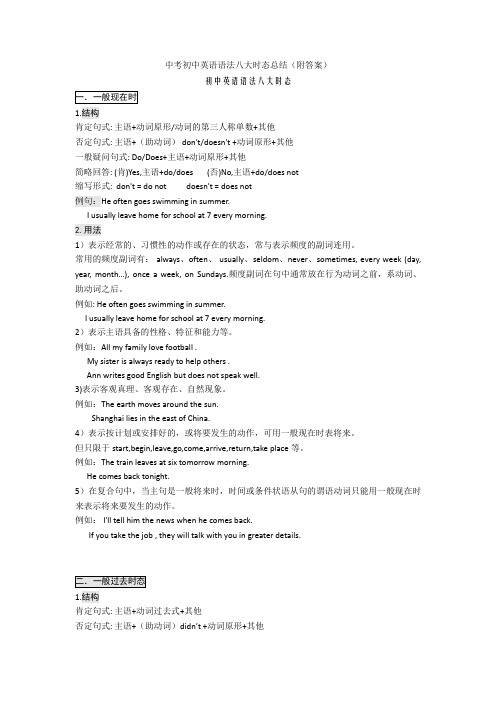
中考初中英语语法八大时态总结(附答案)初中英语语法八大时态1.结构肯定句式: 主语+动词原形/动词的第三人称单数+其他否定句式: 主语+(助动词) don't/doesn't +动词原形+其他一般疑问句式: Do/Does+主语+动词原形+其他简略回答: (肯)Yes,主语+do/does (否)No,主语+do/does not缩写形式: don't = do not doesn't = does not例句:He often goes swimming in summer.I usually leave home for school at 7 every morning.2.用法1)表示经常的、习惯性的动作或存在的状态,常与表示频度的副词连用。
常用的频度副词有: always、often、 usually、seldom、never、sometimes, every week (day, year, month…), once a week, on Sundays.频度副词在句中通常放在行为动词之前,系动词、助动词之后。
例如: He often goes swimming in summer.I usually leave home for school at 7 every morning.2)表示主语具备的性格、特征和能力等。
例如:All my family love football .My sister is always ready to help others .Ann writes good English but does not speak well.3)表示客观真理、客观存在、自然现象。
例如:The earth moves around the sun.Shanghai lies in the east of China.4)表示按计划或安排好的,或将要发生的动作,可用一般现在时表将来。
八大时态综合讲解及专项练习题共八页打印版

e.g We clean the room every day.
2.一般过去时:主语+did
e.g We cleaned the room just now.
3.现在进行时:主语+am/is/are doing
e.g We are cleaning the room now.
3.基本结构:be动词;行为动词
4.否定形式:was/were+not;在行为动词前加didn't,同时还原行为动词。
5.一般疑问句:was或were放于句首;用助动词do的过去式did提问,同时还原行为动词。
6.例句:She often came to help us in those days.
A. went swimming B. go swimming C. visited grandparents
一般过去时
一.用“am , is , was”填空
1. I _____ a teacher now. I _____ a student five years ago.
2. Where ______ it now?
6.例句:It seldom snows here.
He is always ready to help others.
Action speaks louder than words.
二、一般过去时:
1.概念:过去某个时间里发生的动作或状态;过去习惯性、经常性的动作、行为。
2.时间状语:ago, yesterday, the day before yesterday, last week(year, night, month…), in 1989, just now, at the age of 5, one day, long long ago, once upon a time, etc.
初中英语八大时态练习试题及答案(详解)
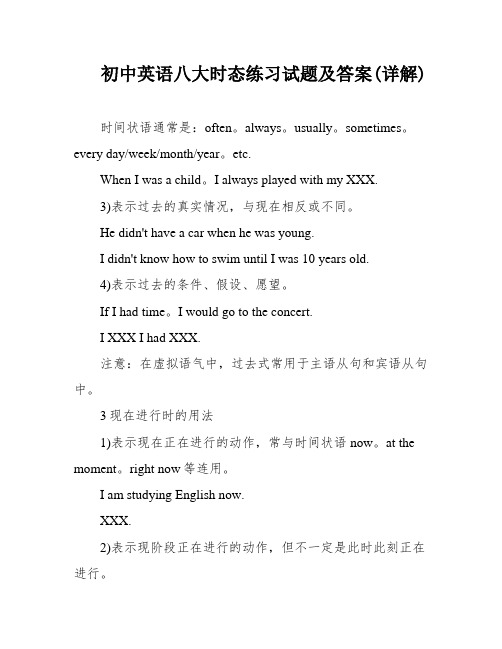
初中英语八大时态练习试题及答案(详解)时间状语通常是:often。
always。
usually。
sometimes。
every day/week/month/year。
etc.When I was a child。
I always played with my XXX.3)表示过去的真实情况,与现在相反或不同。
He didn't have a car when he was young.I didn't know how to swim until I was 10 years old.4)表示过去的条件、假设、愿望。
If I had time。
I would go to the concert.I XXX I had XXX.注意:在虚拟语气中,过去式常用于主语从句和宾语从句中。
3现在进行时的用法1)表示现在正在进行的动作,常与时间状语now。
at the moment。
right now等连用。
I am studying English now.XXX.2)表示现阶段正在进行的动作,但不一定是此时此刻正在进行。
He is learning Chinese this semester.XXX.注意:现在进行时表示的动作必须是正在进行的,而不是已经完成的或惯性的动作。
4过去进行时的用法1)表示过去某一时刻正在进行的动作。
I was watching TV when she called me.They were having dinner at 7 o'clock last night.2)表示过去某段时间内正在进行的动作。
I was XXX.He was working on the project for two weeks.注意:过去进行时强调的是动作的持续性和进行性,常与表示过去的时间状语连用。
5一般将来时的用法1)表示将来某一时刻要发生的动作或存在的状态。
I will go to the beach XXX.She will be 30 years old next month.2)表示将来经常性或惯性的动作。
初中英语八大时态全套精讲及练习题(附答案)
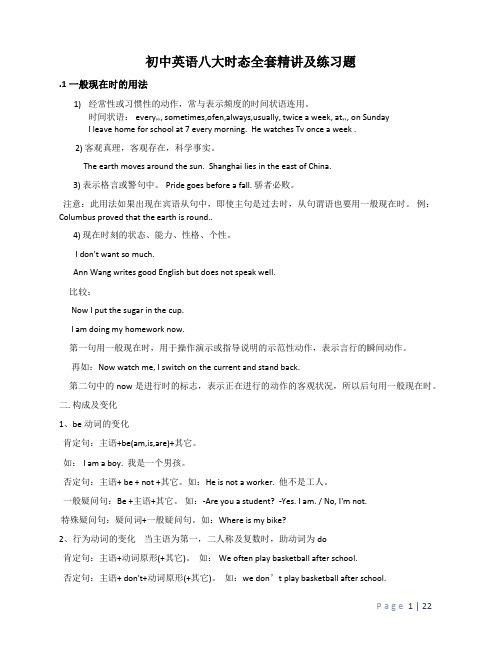
初中英语八大时态全套精讲及练习题.1 一般现在时的用法1)经常性或习惯性的动作,常与表示频度的时间状语连用。
时间状语: every…, sometimes,ofen,always,usually, twice a week, at…, on SundayI leave home for school at 7 every morning. He watches Tv once a week .2) 客观真理,客观存在,科学事实。
The earth moves around the sun. Shanghai lies in the east of China.3) 表示格言或警句中。
Pride goes before a fall. 骄者必败。
注意:此用法如果出现在宾语从句中,即使主句是过去时,从句谓语也要用一般现在时。
例:Columbus proved that the earth is round..4) 现在时刻的状态、能力、性格、个性。
I don't want so much.Ann Wang writes good English but does not speak well.比较:Now I put the sugar in the cup.I am doing my homework now.第一句用一般现在时,用于操作演示或指导说明的示范性动作,表示言行的瞬间动作。
再如:Now watch me, I switch on the current and stand back.第二句中的now是进行时的标志,表示正在进行的动作的客观状况,所以后句用一般现在时。
二. 构成及变化1、be动词的变化肯定句:主语+be(am,is,are)+其它。
如: I am a boy. 我是一个男孩。
否定句:主语+ be + not +其它。
如:He is not a worker. 他不是工人。
初中英语八大时态详细语法解析习题及答案
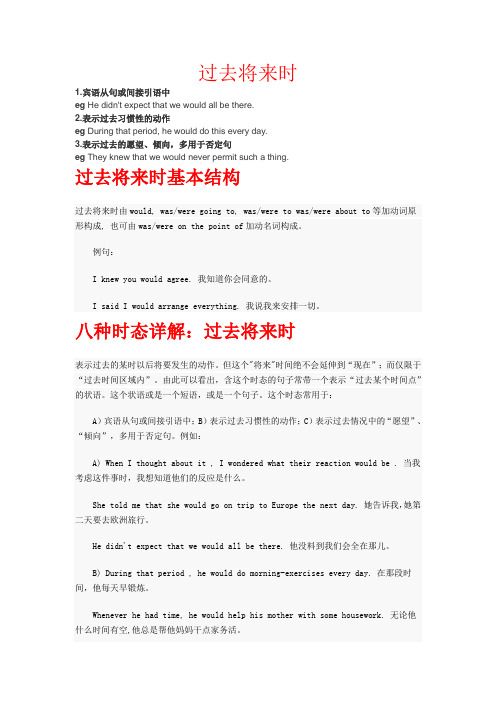
过去将来时1.宾语从句或间接引语中eg He didn't expect that we would all be there.2.表示过去习惯性的动作eg During that period, he would do this every day.3.表示过去的愿望、倾向,多用于否定句eg They knew that we would never permit such a thing.过去将来时基本结构过去将来时由would, was/were going to, was/were to was/were about to等加动词原形构成, 也可由was/were on the point of加动名词构成。
例句:I knew you would agree. 我知道你会同意的。
I said I would arrange everything. 我说我来安排一切。
八种时态详解:过去将来时表示过去的某时以后将要发生的动作。
但这个"将来"时间绝不会延伸到“现在”;而仅限于“过去时间区域内”。
由此可以看出,含这个时态的句子常带一个表示“过去某个时间点”的状语。
这个状语或是一个短语,或是一个句子。
这个时态常用于:A)宾语从句或间接引语中;B)表示过去习惯性的动作;C)表示过去情况中的“愿望”、“倾向”,多用于否定句。
例如:A) When I thought about it , I wondered what their reaction would be . 当我考虑这件事时,我想知道他们的反应是什么。
She told me that she would go on trip to Europe the next day. 她告诉我,她第二天要去欧洲旅行。
He didn't expect that we would all be there. 他没料到我们会全在那儿。
(中考英语资料)初中英语语法八大时态总结(完整版)含答案
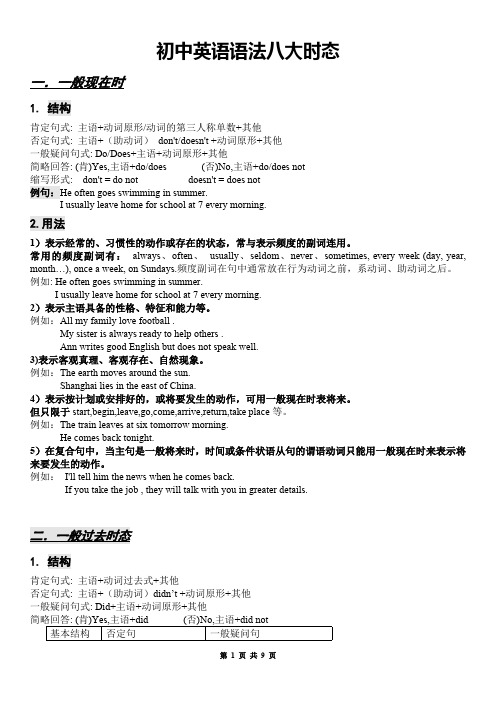
初中英语语法八大时态一.一般现在时1. 结构肯定句式: 主语+动词原形/动词的第三人称单数+其他否定句式: 主语+(助动词)don't/doesn't +动词原形+其他一般疑问句式: Do/Does+主语+动词原形+其他简略回答: (肯)Yes,主语+do/does (否)No,主语+do/does not缩写形式: don't = do not doesn't = does not例句:He often goes swimming in summer.I usually leave home for school at 7 every morning.2.用法1)表示经常的、习惯性的动作或存在的状态,常与表示频度的副词连用。
常用的频度副词有:always、often、usually、seldom、never、sometimes, every week (day, year, month…), once a week, on Sundays.频度副词在句中通常放在行为动词之前,系动词、助动词之后。
例如: He often goes swimming in summer.I usually leave home for school at 7 every morning.2)表示主语具备的性格、特征和能力等。
例如:All my family love football .My sister is always ready to help others .Ann writes good English but does not speak well.3)表示客观真理、客观存在、自然现象。
例如:The earth moves around the sun. Shanghai lies in the east of China.4)表示按计划或安排好的,或将要发生的动作,可用一般现在时表将来。
中考英语八大时态总结与练习
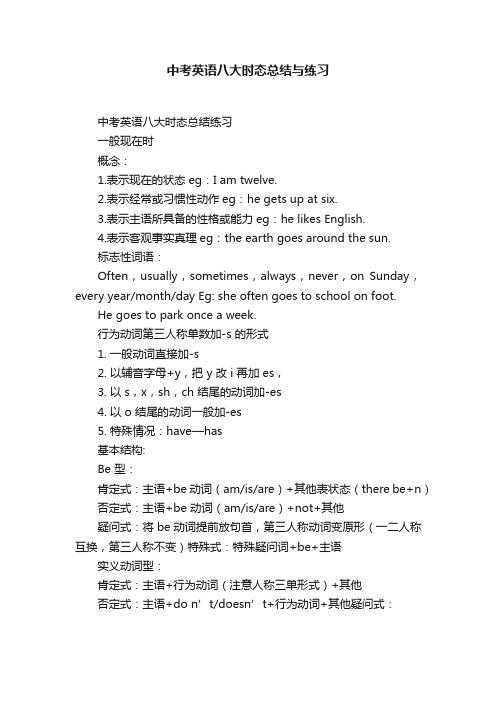
中考英语八大时态总结与练习中考英语八大时态总结练习一般现在时概念:1.表示现在的状态eg:I am twelve.2.表示经常或习惯性动作eg:he gets up at six.3.表示主语所具备的性格或能力eg:he likes English.4.表示客观事实真理eg:the earth goes around the sun.标志性词语:Often,usually,sometimes,always,never,on Sunday,every year/month/day Eg: she often goes to school on foot.He goes to park once a week.行为动词第三人称单数加-s 的形式1. 一般动词直接加-s2. 以辅音字母+y,把 y 改 i 再加 es,3. 以 s,x,sh,ch 结尾的动词加-es4. 以 o 结尾的动词一般加-es5. 特殊情况:have—has基本结构:Be 型:肯定式:主语+be 动词(am/is/are)+其他表状态(there be+n)否定式:主语+be 动词(am/is/are)+not+其他疑问式:将 be 动词提前放句首,第三人称动词变原形(一二人称互换,第三人称不变)特殊式:特殊疑问词+be+主语实义动词型:肯定式:主语+行为动词(注意人称三单形式)+其他否定式:主语+do n’t/doesn’t+行为动词+其他疑问式:一般式:Do/Does+主语+行为动词原形+其他特殊式:特殊疑问词+do/does+主语+谓语小试牛刀:写出下列动词的第三人称形式wash:match:study:finish:go:snow:carry:stop:see:drive:let:teach:keep:join:put:do:drink:toy:play: begin:take:run:fly:talk:stay:look:watch:think:carry:fix:单项选择1. There an English film at the cinema now.A:is B:are C:am D:be2. The picture nice.A:look B:looks C:looked D:be look3. He sits down and soon asleep.A:fall B:falling C:falled D: falls4. The water sweet.A:drinking B:drinks C:drink D:to drink5. I up at six but Mike up at sevenA:get,gets B:get ,get C:gets,get D:getting, to get6. My father for eight hours every day.A:working B:works C:work D:to work7. Uncle Wang never English, because he know how to say it.A:speak,doesn’t B:speak,don’t C:speaks,don’t D:speaks,doesn’t 8. On Sunday my daughter watching TV and my son to play footballwith his friends.A:like,want B:likes,want C:like,wants D:likes,wants 9. Su Yang usually some clothes on Sunday.A:washed B:washs C:washes D:washing10. Su Hai and Su Yang eight lessons this term.A:have B:has C:haves D:having用所给词的正确形式填空A. We often (not play)on the playground.B.you (brush) your teeth every day.C. How many lessons your classmate (have) on Sunday.D. It (take) me two hours to finish my homework every day.E. The child often (watch) TV in the evening.F. What (do) he usually (do) after school.G. John (study) Math , Chinese ,English ,Science and Art at school.H. Mr. Wang often (go) to Shanghai.I. There (be) a football match on TV every morning.J. We (not watch)TV on Monday.句式训练Do you like to play football after school?肯定句肯定/否定回答:I have many books.否定句:一般疑问句:肯定回答:否定回答:Nancy doesn’t run fast.肯定句:I usually play football on Friday afternoon.否定句:一般疑问句:特殊疑问句:肯定/否定回答:Tom does his homework at home.否定句:一般疑问句:特殊疑问句:Mike has two letters for him.否定句:一般疑问句:特殊疑问句:否定回答:判断正误1. Is your brother speak English?2. Does he likes going fishing?3. Jane do his homework every morning.4. He like play basketball with his friends.5. We eats dinner at six and go to bed at eleven.6. My dog runs fast.7. He speak English very well.8. What do they usually do on Saturday.9. My mother don’t have breakfast this morning.10. I like reading books on the library every day.中考真题1.Jenny! Do you know that one-third of the boys in our class the singer Zhang Shao Han?A. likeB. likesC. liking2. The sense of happiness will increase if you what you like to do.A. doB. didC. will do3. Betty will ring me up when she in Beijing.A. arriveB. arrivesC. arrivedD. will arrive4. If you your homework, you can go out to play football.5.Now my father his bike to work every day instead of driving.A. rideB. r od eC. ridesD. will ride6. This girl is rea d y t o help p eo pl e an y time. Wh e n sh e is on t h e bu s,sh e al w a y s her seat to someone in need.A. givesB. giveC. gaveD. giving概念:一般过去时表示过去某个时间収生的动作或存在的状态. Eg: I got up at seven yesterday表示过去经常収生的动作或存在的状态. Eg: he always went to school by car last term标志性词语:yesterday,last month/year/week/night,the day before yesterday,in the past,at that time,two days ago,just n ow……..动词过去时的变化规则:一般在词尾直接+ed play——played以 e 结尾的动词直接+d taste——tasted末尾三个字母以“辅+元+辅”且为重读闭音节,双写末尾辅音+ed stop——stopped 以辅音字母+y,改 y 为 i 再+ed study——studied不规则动词过去式:am/is: a re:do:see:sa y:give: eat:w rit e: sp en d:get:take:sp eak:drin k:g o:r un:rid e:sle ep:c o me:sin g:swim:s t and:has/ha ve:pu t:sit:rea d:结构:Be 型肯定式:主语+be 动词(was/were)+其他否定式:主语+wasn’t/weren’t+其他疑问式:Be 动词+主语+其他(一二人称互换,第三人称不变)特殊疑问句:特殊疑问词+was/were+主语+其他实义动词型肯定式:主语+动词过去式+其他否定式:主语+didn’t+动词原形+其他疑问式:Did+主语+动词原形+其他特殊疑问句:特殊疑问词+did+主语+动词原形+其他用所给单词正确形式填空◆We (enjoy) ourselves at the party last night.◆Jack (study) for the English test last Sunday.◆ you (go) to the Great Wall last year?◆What day (be) it yesterday?◆The old man (be)ill and went to see a doctor.◆We (have) a party last night.◆We (visit) the museum and went home.◆—How (be) the students? —They were very friendly.◆My mother (not do) housework yesterday.◆—he (have) lunch at nine? —No, he did n’t.◆They (buy) a guitar yesterday.◆the cat (eat)a bird yesterday night.◆They (play)chess in the classroom last PE lesson.◆Nancy (pick)up orange on the farm last week.◆My mother (cook)a nice food last spring festival.◆I (be)at school just now.◆He (be)at the camp last week.◆The mobile phone (be)on the table yesterday evening.◆I (make)a model ship with Mike yesterday.◆What (do)you do last month.单项选择( ) 1. Lee his mobile phone at home.A. leaveB. leavesC. leavedD. left( ) 2. he a good rest? No, he didn’t.A. Do, hadB. Did, haveC. Did, hadD. Was, had( ) 3. As soon as he , he to his family.A. arrived, writesB. arrived, writtenC. arrived, wroteD. arriveds, write( ) 4. Mr. Black was late because he his way.A. lostedB. loseC. losesD. lost( ) 5. When Lee school this morning?A. did, got toB. did, get toC. did, getD. did, got( ) 6. Will you please say it again? I quite you.A. didn’t, hearB. don’t, heardC. didn’t, heardD. don’t, hear ( ) 7. you at six o’c lock yesterday?A. Do ,get upB. Did, get upC. Do, got upD. Did, got up ( ) 8.What did you see ?A. nowB. every dayC. these daysD. just now ( ) 9.He went into the room and the door.A. lockB. lockingC. locksD. locked ( ) 10. —What you last week? —I bought a bag.A. did ,buyB. did , boughtC. do, buyD. do, bought ( ) 11. —he his lunch? —Yes, he did.A. Does ,hasB. Does, haveC. Did, haveD. Did, had ( )12.—Did the thieves into the car? —No, they .A. fell, did n’tB. fall(落下), didC. jump(跳), didn’tD. jump, did ( ) 13. -When did May come back from Hong Kong?-She from Hong Kong last Friday.A. come backB. comes backC. returned backD. came back ( ) 14. she this dictionary in the bookshop nearby last week?A. Did, buyB. Does, buyC. Did, boughtD. Does, buys ( ) 15. He to the station this morning and was for the train.A. hurry, in timeB. hurries, on timeC. hurried, in timeD. hurried, at time句型转换1. Frank read an interesting book about history. (一般疑问句)Frank an interesting book about history?2. Thomas spent RMB 10 on this book. (否定句)Thomas RMB 10 on this book.3. I didn’t have any friends. (一般疑问句)have friends?4. She watched TV after supper(划线部分提问)she after supper.5. There was some orange in the fridge.(一般疑问句)there_ orange in the fridge?改错题1. How is Jane yesterday?2. He go to school by bus last week.3. He often goes home at 6:00 last month.4. I can fly kites seven years ago.5. Did you saw him just now.6. T om wasn’t watch TV last night.7. I didn’t my homework yesterday. 8. He wait for you three hours ago.9. Who find it just now ? 10. What did he last week?综合训练1. They read English last night.否定句:一般疑问句:肯定/否定回答:划线部分提问:2. She didn’t buy a dictionary last week.肯定句:一般疑问句:肯定/否定回答:划线部分提问:一般将来时概念:现在看将要収生的动作或存在的状态.标志性词语:Tomorrow,soon,next year,next year / week / month, in a few days, in the future, this afternoon,the day after tomorrow,one hour later,tomorrow morning。
英语八大时态介绍(附练习题)

英语八大时态介绍一般现在时一般现在时基本用法介绍:(一)一般现在时的功能1.表示事物或人物的特征、状态。
如:The sky is blue.天空是蓝色的。
2.表示经常性或习惯性的动作。
如:I get up at six every day.我每天六点起床。
3.表示客观现实。
如:The earth goes around the sun.地球绕着太阳转。
(二)一般现在时的构成1.be动词:主语+be(am,is,are)+其它。
如:I am a boy.我是一个男孩。
2.行为动词:主语+行为动词(+其它)。
如:We study English.我们学习英语。
当主语为第三人称单数(he, she,it)时,要在动词后加"-s"或"-es"。
如:Mary likes Chinese.玛丽喜欢汉语。
(三)一般现在时的变化1. be动词的变化。
否定句:主语+ be + not +其它。
如:He is not a worker.他不是工人。
一般疑问句:Be +主语+其它。
如:-Are you a student? -Yes. I am. / No, I'm not.特殊疑问句:疑问词+一般疑问句。
如:Where is my bike?2.行为动词的变化。
否定句:主语+ don't( doesn't ) +动词原形(+其它)。
如:I don't like bread.当主语为第三人称单数时,要用doesn't构成否定句。
如:He doesn't often play.一般疑问句:Do( Does ) +主语+动词原形+其它。
如:- Do you often play football?当主语为第三人称单数时,要用does构成一般疑问句。
如:- Does she go to work by bike? - Yes, she does. / No, she doesn't.特殊疑问句:疑问词+一般疑问句。
(完整word版)初中英语八大时态讲解及练习题目(全)
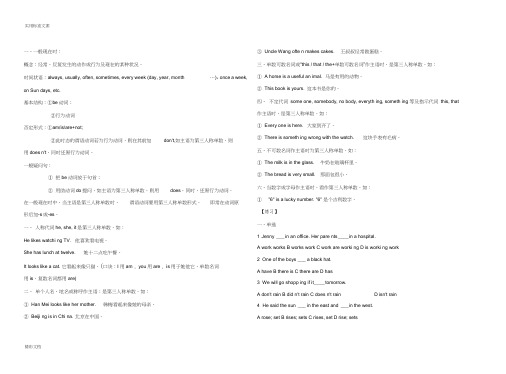
一、一般现在时:概念:经常、反复发生的动作或行为及现在的某种状况。
时间状语:always, usually, often, sometimes, every week (day, year, month …),once a week, on Sun days, etc.基本结构:①be动词;②行为动词否定形式:①am/is/are+not;②此时态的谓语动词若为行为动词,则在其前加don't,如主语为第三人称单数,则用does n't,同时还原行为动词。
一般疑问句:①把be动词放于句首;②用助动词do提问,如主语为第三人称单数,则用does,同时,还原行为动词。
在一般现在时中,当主语是第三人称单数时,谓语动词要用第三人称单数形式,即常在动词原形后加-s或-es。
一、人称代词he, she, it是第三人称单数。
如:He likes watchi ng TV. 他喜欢看电视。
She has lunch at twelve. 她十二点吃午餐。
It looks like a cat. 它看起来像只猫。
(口诀:I用am , you用are , is用于她他它,单数名词用is,复数名词都用are)二、单个人名、地名或称呼作主语;是第三人称单数。
如:①Han Mei looks like her mother. 韩梅看起来像她的母亲。
②Beiji ng is in Chi na. 北京在中国。
③Uncle Wang ofte n makes cakes. 王叔叔经常做蛋糕。
三、单数可数名词或"this / that / the+单数可数名词”作主语时,是第三人称单数。
如:① A horse is a useful an imal. 马是有用的动物。
②This book is yours. 这本书是你的。
四、不定代词some one, somebody, no body, everyth ing, someth ing 等及指示代词this, that 作主语时,是第三人称单数。
初中英语八大时态详细语法解析习题及答案

初中英语八大时态详细语法解析习题及答案文件排版存档编号:[UYTR-OUPT28-KBNTL98-UYNN208]过去将来时1.宾语从句或间接引语中eg He didn't expect that we would all be there.2.表示过去习惯性的动作eg During that period, he would do this every day.3.表示过去的愿望、倾向,多用于否定句eg They knew that we would never permit such a thing.过去将来时基本结构过去将来时由would, was/were going to, was/were to was/were about to等加动词原形构成, 也可由was/were on the point of加动名词构成。
例句:I knew you would agree. 我知道你会同意的。
I said I would arrange everything. 我说我来安排一切。
八种时态详解:过去将来时表示过去的某时以后将要发生的动作。
但这个"将来"时间绝不会延伸到“现在”;而仅限于“过去时间区域内”。
由此可以看出,含这个时态的句子常带一个表示“过去某个时间点”的状语。
这个状语或是一个短语,或是一个句子。
这个时态常用于:A)宾语从句或间接引语中;B)表示过去习惯性的动作;C)表示过去情况中的“愿望”、“倾向”,多用于否定句。
例如:A) When I thought about it , I wondered what their reaction would be .当我考虑这件事时,我想知道他们的反应是什么。
She told me that she would go on trip to Europe the next day. 她告诉我,她第二天要去欧洲旅行。
初中英语:语法八种时态详解及练习
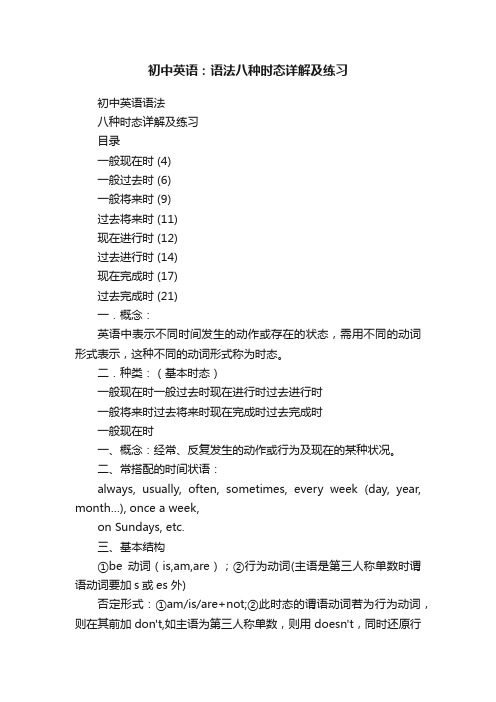
初中英语:语法八种时态详解及练习初中英语语法八种时态详解及练习目录一般现在时 (4)一般过去时 (6)一般将来时 (9)过去将来时 (11)现在进行时 (12)过去进行时 (14)现在完成时 (17)过去完成时 (21)一.概念:英语中表示不同时间发生的动作或存在的状态,需用不同的动词形式表示,这种不同的动词形式称为时态。
二.种类:(基本时态)一般现在时一般过去时现在进行时过去进行时一般将来时过去将来时现在完成时过去完成时一般现在时一、概念:经常、反复发生的动作或行为及现在的某种状况。
二、常搭配的时间状语:always, usually, often, sometimes, every week (day, year, month…), once a week,on Sundays, etc.三、基本结构①be动词(is,am,are);②行为动词(主语是第三人称单数时谓语动词要加s或es 外)否定形式:①am/is/are+not;②此时态的谓语动词若为行为动词,则在其前加don't,如主语为第三人称单数,则用doesn't,同时还原行为动词。
一般疑问句:①把be动词放于句首;②用助动词do提问,如主语为第三人称单数,则用does,同时,还原行为动词。
例句:I go to school at 6 every morning. 每天早上我七点去上学。
Summer follows spring. 春天之后是夏天。
I learned that the earth goes around the sun when I was in primary school. 我在小学就学过地球是围绕太阳转的。
Pride goes before a fall. 骄者必败。
四、基本用法:1) 描述当前时间内经常出现、反复发生的动作或存在的状态。
在这种情景中,句子常带有表示频率的时间状语:always , everyday , often , once a week (month , year , etc.) , sometimes , seldom , usually等等,以表示句中的动作或状态是习惯性的、经常性的。
中考英语八大时态精解+精练+答案

中考英语八大时态精解+精练+答案一、一般现在时1、概念:表示经常发生的情况;有规律出现的情况;总是发生的;事实真理。
2.时间状语:Always, usually, often, sometimes, every week (day, year, month…), once a week (day, year, month…), on Sundays (on Mondays…), etc.3.基本结构:主语+动词原形(如主语为第三人称单数,动词上要改为第三人称单数形式)4.否定形式:主语+am / is / are+not+其他;此时态的谓语动词若为行为动词,则在其前加don't,如主语为第三人称单数,则用doesn't,同时还原行为动词。
5.一般疑问句:把be 动词放于句首;用助动词do 提问,如主语为第三人称单数,则用does,同时,还原行为动词。
eg:①It seldom snows here. 这里很少下雪。
②He is always ready to help others. 他总是乐于帮助别人。
③Action speaks louder than words. 事实胜雄辩。
二、一般过去时1.概念:过去某个时间里发生的动作或状态;过去习惯性、经常性的动作、行为。
2.时间状语:ago,yesterday,the day before yesterday,last week,last (year,night,month…), in 1989, just now, at the age of 5, one day, long long ago, once upon a time,etc.3.基本结构:主语+动词的过去式或be 的过去式+名词4.否定形式:主语+was / were+not+其他;在行为动词前加didn't,同时还原行为动词。
5.一般疑问句:was 或were 放于句首;用助动词do 的过去式did 提问,同时还原行为动词。
中考英语八种时态的讲与练

初中八种时态的复习1. 一般现在时用法:1. 一般现在时表示现在的状态:He is twelve. She is at work.2. 表示经常或习惯性的动作:I get up at 6:30 every day. He reads English every morning.3. 表示主语具备的性格和能力: He is outgoing. She speaks French.4. 普遍的真理和自然规律:The moon goes around the earth. Two plus four is six.结构:1.(肯定句)主语(否定句)主语2. 当主语为第三人称单数的结构如下:(否定句)主语时间标志:1、often, usually, always, sometimes.2、every + 时间类:eg:every day/week/month/year3、On Sundays. once a week. twice a day, in the morning/evening/afternoon.动词的三单形式变化规则1:一般情况加s.2:以s, x. ch, sh , es. 例:does, goes, watches, washes, guesses, fixes.3:以辅音字母加y结尾的动词先变y为i再加es. 例:fly----flies. study----studies练习:1、I________(be )a student . 2、You________( be ) a worker . 3、________( be ) he a teacher ?4、He often ________( go ) to school by bike .5、_____you usually ________( get ) up at sevenin the morning ?6、She sometimes _____( do ) his homework at school .7、______ Lucy _____( play )basketball every day ?8、They ___________( go ) to see their parents every month .1.I will tell him as soon as he _____ backA. comeB. comesC. will comeD. came2. Mary _____ on shoes when she ____ them.A. trie s…buysB. tries… buiesC. trys… buysD. trys… buies3. The girl often ______ cold when she ______.A. cathcs…dancesB. catches… dancesC. catchs…danceesD. catches… dancee4. _____ he ____ himself there? No, I don’t think so.A. Do…enjoyB. Does… enjoiesC. Does… enjoysD. Does…enjoy5. _____ your teacher ____ from them very often? Certainly.A. Do…hearB. Does…hearC. Do… receiveD. receive6. _____ your mother _____ some cleaning on Sundays?A. Does…doesB. Do…doesC. Does…doD. Do… do7. _____ Tom _____to work hard to help his family ? Yes, he _____.A. Has… x…doesB. Has…x…doesC. Does…has…hasD. Does… have…does8. Which teacher _____ lessons to you every day ?A. does …givesB. does… giveC. do… giveD. gives9. Smith does not go fishing on weekdays, ____? _____ , he does.A. does he…NoB. does he…YesC. doesn’t he…NoD. doesn’t he…Yes10.Mr Black often _____ fishing on Sundays, _____ he ?A. goes…doesn’tB. goes…isn’tC. doesn’t go…doesD. doesn’t go…is11.He usually _____ TV on Sunday evening.A. watchB. watchesC. watchingD. is watching12. Well go to play with snow if it ______ tomorrow.A. snowB. snowsC. will snowD. snowed13. Neither I nor he ______ French.A. speakB. doesn’t speakC. speaksD. doesn’t speak14. Nobody ______ how to run this machines.A . know B. have known C. knows D. is knowing15. The Young Pioneer _____ water for the old man every day.A. carryB. bringC. takesD. carries2. 现在进行时用法:表示现在(说话瞬间)正在进行或发生的动作 I am listening to my teacher.结构:1. 肯定句主语+be(am, is, are ) +doing + 其它 We are watching TV now.2. 否定句主语+be not +doing + 其它 She isn’t looking at you.3. 一般疑问句:Be + 主语+doing + 其它?回答:Yes, 主语be ;No, 主语be not.Are they doing their homework now? Yes, they are./ No, they aren’t.时间标志:1. now 2. look 、listen 3.these days 4. at present 5. at the moment 6. these days 7. from three to five 8.上下文提示动词加ing变化规则:一般情况加ing 例:go----going ask----asking不发音字母e结尾的动词,去e加ing 例:write----writing close----closing以重读闭音节结尾的动词,先双写这一字母,再加ing.例:get--gettingsit, cut, hit, put, forget, run, begin, swim, shop, stop, prefer.4. 以ie 结尾的动词,把ie改为y , 再加ing : lie--lying练习:1、The twins ______________( listen ) to the old man now .2、Look, they _______________( wash ) over there .3、Listen , who ________________( sing ) in the room ?16. Some are ______ in the river and some are ______ games.A. swimming… playingB. swimming…plaiingC. swimming… I playingD. swimming…plaing17. Look ! The boy students are _____ football while the girls are _____ .A. playing… danceB. playing… dancingC. play… dancingD. play… dance18. He _____ to do his lessons at eight every evening.A. is beginningB. is beginningC. beginD. begins19. _____ he _____ on well with his friends this term ?A. Does…getsB. Does…getC. Is…gettingD. Is…geting20. Mr Smith _____ short stories, but he ____ a TV play these days.A. is writing…is writingB. is writing… writesC. writes… is writingD. writes… writes3. 一般将来时用法:表示在将来某一时间发生的动作或存在的状态。
初中英语八大时态详细语法解析习题及答案

过去将来时1.宾语从句或间接引语中eg He didn't expect that we would all be there.2.表示过去习惯性的动作eg During that period, he would do this every day.3.表示过去的愿望、倾向,多用于否定句eg They knew that we would never permit such a thing.过去将来时基本结构过去将来时由would, was/were going to, was/were to was/were about to等加动词原形构成, 也可由was/were on the point of加动名词构成。
例句:I knew you would agree. 我知道你会同意的。
I said I would arrange everything. 我说我来安排一切。
八种时态详解:过去将来时表示过去的某时以后将要发生的动作。
但这个"将来"时间绝不会延伸到“现在”;而仅限于“过去时间区域内”。
由此可以看出,含这个时态的句子常带一个表示“过去某个时间点”的状语。
这个状语或是一个短语,或是一个句子。
这个时态常用于:A)宾语从句或间接引语中;B)表示过去习惯性的动作;C)表示过去情况中的“愿望”、“倾向”,多用于否定句。
例如:A) When I thought about it , I wondered what their reaction would be . 当我考虑这件事时,我想知道他们的反应是什么。
She told me that she would go on trip to Europe the next day. 她告诉我,她第二天要去欧洲旅行。
He didn't expect that we would all be there. 他没料到我们会全在那儿。
初中英语八大时态详细语法解析习题及答案

过去将来时1.宾语从句或间接引语中eg He didn't expect that we would all be there.2.表示过去习惯性的动作eg During that period, he would do this every day.3.表示过去的愿望、倾向,多用于否定句eg They knew that we would never permit such a thing.过去将来时基本结构过去将来时由would, was/were going to, was/were to was/were about to等加动词原形构成, 也可由was/were on the point of加动名词构成。
例句:I knew you would agree. 我知道你会同意的。
I said I would arrange everything. 我说我来安排一切。
八种时态详解:过去将来时表示过去的某时以后将要发生的动作。
但这个"将来"时间绝不会延伸到“现在”;而仅限于“过去时间区域内”。
由此可以看出,含这个时态的句子常带一个表示“过去某个时间点”的状语。
这个状语或是一个短语,或是一个句子。
这个时态常用于:A)宾语从句或间接引语中;B)表示过去习惯性的动作;C)表示过去情况中的“愿望”、“倾向”,多用于否定句。
例如:A) When I thought about it , I wondered what their reaction would be .当我考虑这件事时,我想知道他们的反应是什么。
She told me that she would go on trip to Europe the next day. 她告诉我,她第二天要去欧洲旅行。
He didn't expect that we would all be there. 他没料到我们会全在那儿。
初中英语八大时态详细语法解析习题及答案
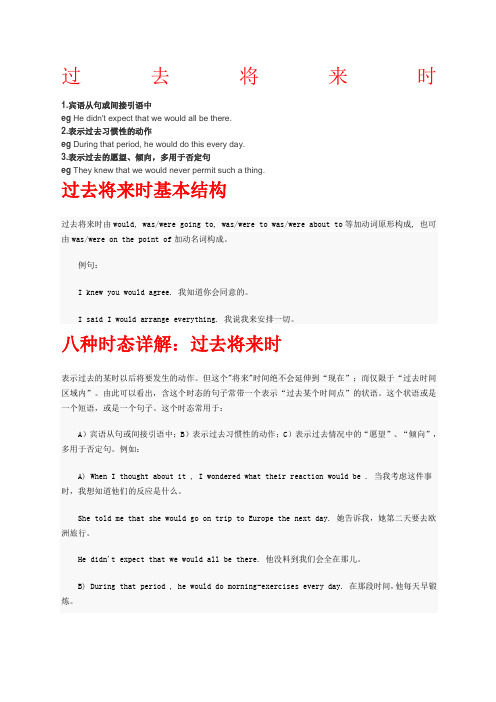
过去将来时1.宾语从句或间接引语中eg He didn't expect that we would all be there.2.表示过去习惯性的动作eg During that period, he would do this every day.3.表示过去的愿望、倾向,多用于否定句eg They knew that we would never permit such a thing.过去将来时基本结构过去将来时由would, was/were going to, was/were to was/were about to等加动词原形构成, 也可由was/were on the point of加动名词构成。
例句:I knew you would agree. 我知道你会同意的。
I said I would arrange everything. 我说我来安排一切。
八种时态详解:过去将来时表示过去的某时以后将要发生的动作。
但这个"将来"时间绝不会延伸到“现在”;而仅限于“过去时间区域内”。
由此可以看出,含这个时态的句子常带一个表示“过去某个时间点”的状语。
这个状语或是一个短语,或是一个句子。
这个时态常用于:A)宾语从句或间接引语中;B)表示过去习惯性的动作;C)表示过去情况中的“愿望”、“倾向”,多用于否定句。
例如:A) When I thought about it , I wondered what their reaction would be . 当我考虑这件事时,我想知道他们的反应是什么。
She told me that she would go on trip to Europe the next day. 她告诉我,她第二天要去欧洲旅行。
He didn't expect that we would all be there. 他没料到我们会全在那儿。
- 1、下载文档前请自行甄别文档内容的完整性,平台不提供额外的编辑、内容补充、找答案等附加服务。
- 2、"仅部分预览"的文档,不可在线预览部分如存在完整性等问题,可反馈申请退款(可完整预览的文档不适用该条件!)。
- 3、如文档侵犯您的权益,请联系客服反馈,我们会尽快为您处理(人工客服工作时间:9:00-18:30)。
初高中语法衔接八大时态基本结构(附练习题及答案)一般现在时态:主语+动词的一般现在式(注意三单)+其他成分例子:We study English everyday. He/She/Li Ping studies English hard. 一般过去时态:主语+动词的一般过去式+其他成分例子:We/He studied English last year.一般将来时态:主语+ will/ shall/am/is/are going to/ +动词原形+其他成分(about)to例子:We/He will study English next year.过去将来时态:主语+would +动词原形+其他成分例子:He told us that we would study English in 3 days.现在进行时态:主语+ am/is/are +动词的现在分词(v-ing形式)+其他成分例子:We are studying English now. he is studying English now.过去进行时态:主语+was/were+ v-ing形式+其他成分例子:We were studying English this time yesterday.He was studying English this time yesterday.现在完成时态:主语+ have/has done(动词的过去分词)+ 其他成分例子:We have studied English for 5 years.He has studied English for 5 years.过去完成时态:主语+ had done + 其他成分例子:He/We had studied English for 3 years before he/we enteredBo Luo Middle School.用动词的适当形式填空:1、He sometimes ___________(stay up) late into the night.2、In my opinion,eating too much junk food everyday _______(do) harm to our health.3、I ____________(lend) him my bike if he_________(take) good care of it.4、It _____(be) the custom to decorate the room before Christmas.5、We were playing cards when Mr. Black ________________(come in)。
6、The boy ___________( not steal) the bike because he was playing basketball at that time.7、A great fire___________(break out) in the building last night. Someone _________(call) the fire station, but when the firefighters __________(arrive), the fire had already been put off.8、My father ________(not walk) the dog yesterday because the dog ___(be) ill..9、We __________(attend) an important meeting in Guangzhou this weekend.10、There ______(be) a birthday party tomorrow.11、Don’t be worried. I ___________ (help) you.12、He is so seriously ill and he _______________ (die).13、He is fifty-six. In two years he _______(be) fifty-eight.14、She said that she __________ (return) in 2 days.15、He said that it __________ (be) possible to build a platform in the centre of the Channel.16、We were all surprised when he made it clear that he ________________ (leave) office soon.17、Our manager___________(write) a report in the office now.18、The headmaster _______________(leave) China for Austria next Monday..19、The girl ________________ (always, talk) loud in public.20、They __________ (build) a new cinema here. They hope to finish it next month.21、E-mail, as well as telephones, __________ (play) an important part in daily communication.22、Because the shop _______________ (close) down, all the T-shirts are sold at half price.23、Look! It ________(rain) hard. We'll get wet if we go out.24、They (take) physical exercise at seven this morning.25、She (telephone) a friend when I came in.26、he (play) computer games at nine last night27、I ____________________ (never, see) a robot before.28、She _________________ (collect) over 500 Chinese stamps since she came to China last year.29、They ______________(marry) for 50 years.30、I _______________ (not, hear) from Tom so far.31、It is/has been four years since he _____(go) abroad to further his studies.他去国外深造已四年了。
32、I wonder why Jenny_______(not write) to us recently. We should have heard from her by now.33、After he________ (leave) the room, the boss came in.34、We ___________ (arrive) home before it snowed.35、By the end of last year, we _____________ (produce) 20,000 cars.36、The train ______________ (leave) before we reached the station.37、He said his first teacher _____ (die) at least 10 years before.38、We ____ no sooner ___ (get) on than the bus started.= No sooner ____ we ____ on than the bus started.39、Einstein ____________ (learn)advanced maths by the time he was 14.40、40.The film __________ (be) on for 10 minutes when I got to the cinema.Answers:1.stays up2.does3. will lend, takes4. is5. came6. didn’t steal7. broke out, called, arrived8. didn't walk, was 9. will attend 10.will be 11.will help12. is dying 13. will be 14. would return 15. would be16. would leave 17. is writing 18. is leaving 19. is always talking20. are building 21. is playing 22. is closing 23. is raining24. were taking 25. was telephoning 26. was playing 27. have never seen28. has collected 29. have been married 30. haven’t heard 31. went32. hasn’t written 33. had left 34. had arrived 35. had produced36. had left 37.had died 38. had got, had… got 39. had learned40. had been on。
